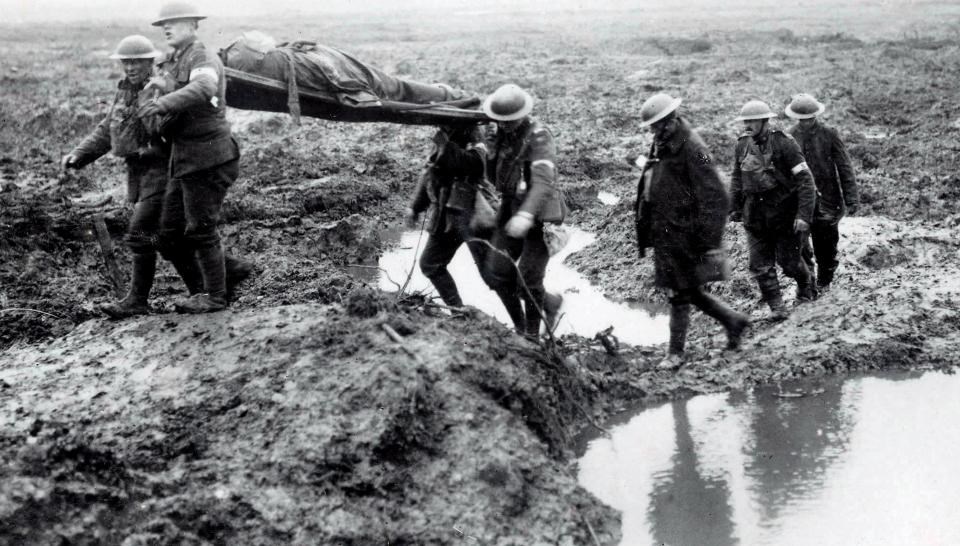One hundred years ago this very week, Canadian troops brought to an end the battle for Passchendaele, a small town at the peak of the Ypres Salient in Belgian Flanders.
The filter of history allows us to see the Battle of Passchendaele as a unique event, when in fact it was the final action in a series of battles that were launched in April of 1917 as part of a broad offensive by the British and French armies and their allies, seeking to end what at that time was a blood-soaked stalemate of trench warfare on the western front.
It was the Great War. The War To End All Wars. The War for Civilization.
Eventually, it became known as the First World War.
Mechanized, industrial warfare on a scale never seen before, a conflict that involved all of the great nations of the planet, and ultimately consumed anywhere from 15 to 18 million lives.
Of those dead, 64,996 were Canadians.
At the time, Canada served as part of the British Empire, along with Australia and New Zealand, and many other colonies.
Serving under British Command in the early years of the war, by 1917 Canada had established itself as a unique and dreaded fighting force, and established her reputation in April 1917 at Vimy Ridge. From that moment on, Canada would fight as an independent force.
The 1917 offensives that led to Passchendaele were a continuous series of battles that for Canada included not only Vimy Ridge, but the Battle of Arras, the Battle of Arleux, the Third Battle of the Scarpe, and Hill 70, a much lesser-known Canadian victory that equaled the heroic actions of Vimy Ridge.
So when Canadian forces entered the line at Passchendaele in late October, they were among the most experienced, accomplished (and dreaded) troops in the entire theatre of war, with a daunting reputation for efficiency in battle, tenacity in the face of adversity, and a ferocity that struck fear into any opponent.
By October 1917, Passchendaele was really just a red-brick stain on the landscape, but was located on a ridge that gave a commanding view of the region, and so carried strategic value.
Preceding Canadian involvement, various elements of the British, Australian and New Zealand armies had fought to exhaustion along the frontier, and when it came time for the final attempt at victory before winter set in, Canada was called.
The Canadians launched a series of attacks on Oct. 26, fighting through some of the most abominable conditions of the war; a landscape thoroughly reduced to shell-holes, mud, and decomposing corpses.
In the end, victory belonged to the Canadians, taking Passchendaele on Nov. 10, 1917.
More than 4,000 Canadians died in the Passchendaele campaign, another 12,000 wounded in a battle that has become the embodiment of the worst horrors of the Great War, the futility of the fighting, and the blatant disregard for human life demonstrated by some of the senior leaders in that conflict.
And futile it was. In 1918 the spring German offensive recaptured all of the ground taken by the Canadians the previous year.
Passchendaele, indeed the entire campaign of 1917 from Vimy onward earned Canada a glorious reputation and an honoured place in military history.
In the Great War, more than 64,000 Canadians gave up their lives in the service of our country.
In the next war, another 41,000 Canadians made the ultimate sacrifice for Canada. Korea added another 550.
More than 100,000 Canadians have given their lives in service; a price far too high, and a debt that can never be repaid.
But we can remember them.
On Nov. 11, the City of Richmond will host the Royal Canadian Legion Branch 291, the Army, Navy and Airforce Veterans in Canada Unit 284, 39 Service Battalion, the Royal Canadian Mounted Police, and all of our city’s major public safety agencies and our fine Cadet Corps, in the annual Remembrance Day service at the Richmond Cenotaph at City Hall.
Step off is at 10:40 a.m., and two minutes of silence will be observed on the 11th hour of the 11th day of the 11th month, in memory of those Canadians who, through their commitment to our country, never lived to see this extraordinary nation they created.
— With files from Library and Archives Canada, and City of Richmond Archives, “We Will Remember Them: The Lives Behind the Richmond Cenotaph”; Mary Keen; 1998.
Matthew McBride is a member of the Richmond Remembrance Day Committee and Richmond Poppy Fund



